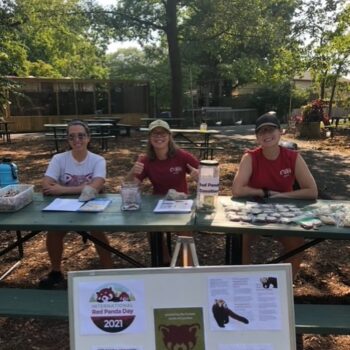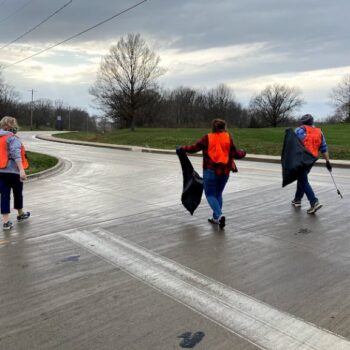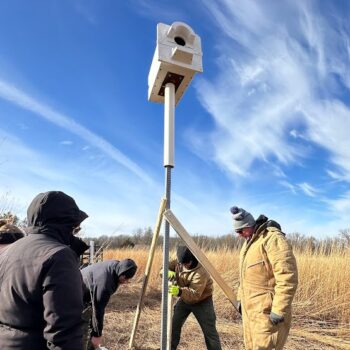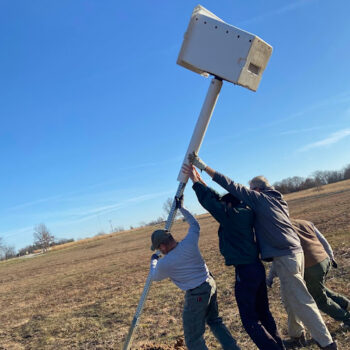In spring 2007, Scovill Zoo formed a local chapter of the American Association of Zoo Keepers (AAZK). The national organization formed in 1967 in San Diego, CA as a resource for zoo keepers to exchange information and continue their education. Scovill Zoo’s AAZK goals include assisting in conservation and animal protection efforts. On several occasions and most recently in 2023, the group raised funds to adopt an Anatolian shepherd, a breed of working dogs that is an important component of cheetah conservation in Namibia, Africa. The dogs guard livestock in areas containing wild cheetahs. The guard dogs keep the cheetahs and other predators away from livestock, which in turn keeps the farmer from shooting the daytime-hunting cheetahs.
Locally, the chapter participates in the Adopt a Street program in Decatur and they pick up trash along the street twice a year. Items collected are recycled or appropriately disposed. The AAZK group also coordinates with the local bowling alley to host an annual Bowling for Rhinos event. Donations raised by chapters support 3 AAZK Conservation Partners: Lewa Wildlife Conservancy, International Rhino Foundation and Action for Cheetahs in Kenya. A small portion of the funds raised also support their Conservation Resource Grant that nonprofits are eligible to apply for. This grant supports projects focused on research and conservation benefiting rhino, their ecosystems, or the communities supporting them. Each of their conservation partners utilizes donations to assist with community relations, vehicle maintenance, camera traps, ranger gear to name a few items.
Scovill Zoo has partnered with the Macon County Conservation District and erected two barn owl nesting boxes on conservation land with several dozen acres of prairie grass. Those two nest boxes were erected in December 2021, and three more nest boxes were put up in December 2023. Other locations are being identified for future nesting boxes around Macon County.
Thinking Green
by Ryan Kirkland
Did you know that today there are thousands of amphibian species in danger of becoming extinct? While some people might think “They’re just a bunch of frogs…big deal!” The truth is, they are a big deal. Amphibians play an important role in our fragile ecosystem. Without them there would be a lot more pests flying around our heads and potentially destroying beneficial plants and crops. Amphibians are also prey for other larger animals in the ecosystem. So not only would pests be abundant, but a chain reaction could occur, causing other animals to starve.
Recycle with Scovill Zoo
By donating gently used items, you save landfill space and help the zoo conserve funds for the continued development of exhibits and programs.
- Microwave
- Dry erase boards & Bookcase
- Animal books in DK Eyewitness Books Series
- Compact AM/FM radio
- Heavy-duty metal shelving
- Metal detector
Equipment & appliances should be in good working order. Please call 217/421-7435.
Cheetah Conservation
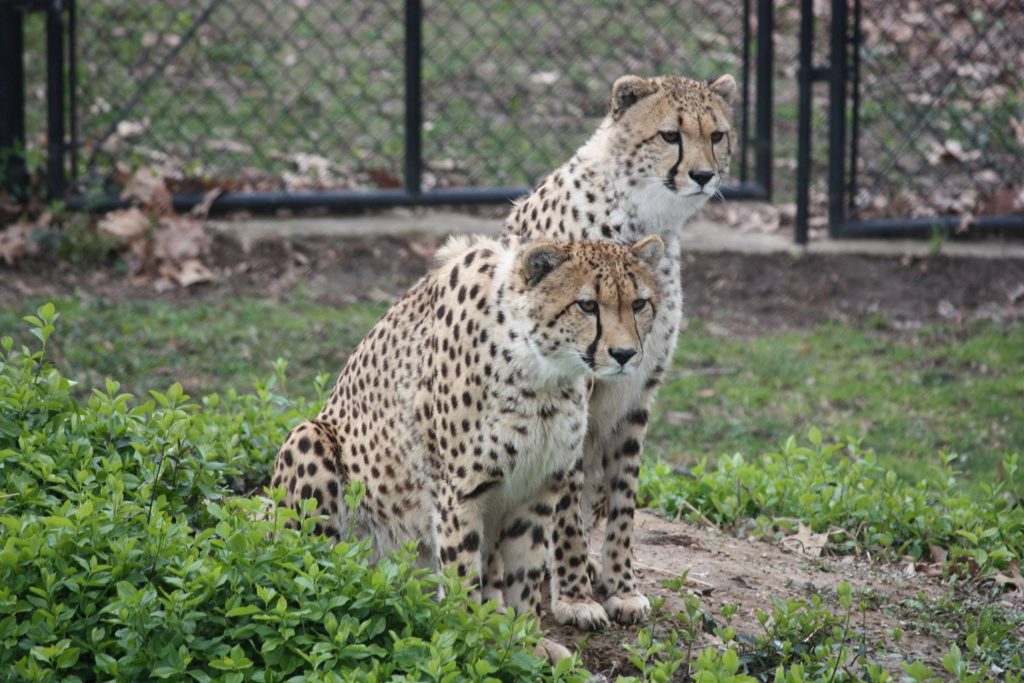
The fastest land animals in the world, cheetahs are a beautiful species whose numbers are dwindling. Cheetahs face many obstacles, including habitat loss, poaching, and competition with large predators. Most wild cheetahs in South Africa live on private land, where they are trapped or killed by ranchers, who often mistakenly blame cheetahs for livestock loss.
The Scovill Zoo community is working to help save cheetahs in the wild. Five cents of each paid zoo admission ($5,000 annually) is donated to the De Wildt Cheetah and Wildlife Conservation Centre, the native land of our South African cheetahs. Scovill Zoo’s contribution helps support the organization’s census study of free-roaming cheetahs in South Africa. To learn the size of the animals’ home ranges, cheetahs are radio-collared and tracked from the air in an ultra-light aircraft. Farmers are surveyed to learn how many cheetahs roam their lands. The goal is to determine how many wild cheetahs remain in South Africa, where they live, and how conflict can be lessened between farmers and wild cheetahs. Scovill Zoo strives to help save the world’s fastest land animal from extinction. If you want to help save the cheetahs, send your tax deductible contribution to: De Wildt Cheetah and Wildlife Trust, c/o Carlson Springs Wildlife Foundation, 8528E County Road 225, Gainesville, Fl 32609; Wildlife Conservation Network, 25745 Bassett Lane, Los Altos, CA 94022 or Cheetah Conservation Fund, 711 Quail Ridge Road, Aledo, TX 76008.
Palm Oil Awareness
Scovill Zoo’s Palm Oil Awareness Mission Statement
To make a difference for all wildlife affected by non-sustainable palm oil production and harvesting by inspiring people to make responsible consumer choices for the betterment of the environment.
What is Palm Oil?
It is a form of edible vegetable oil obtained from the fruit of the African oil palm tree (Elaeis guineensis).
Origin of the Palm Oil Crisis
- Supply and demand pressures are driving the production of palm oil up to an all-time high. Found in cookies, crackers, frozen dinners, shampoo, lotions, cosmetics, pet food, and many other products, palm oil is now the most widely produced edible oil. It is also being used as a possible fuel alternative.
- Millions of acres of rainforest in Borneo & Sumatra are cut down each year to plant more oil palm. Instead of using already cleared land, some companies choose to cut down healthy rainforest. They gain added profits from the timber, and they can ignore the regulations that sustainable plantations abide by.
- The increased demand for palm oil is fueling destruction of the rainforest habitat of Sumatran and Bornean orangutans, pushing those endangered species even closer to extinction. Estimates show that if something isn’t done soon to stop the spread of palm oil plantations into the forests that harbor these orangutans, they will be extinct in ten to fifteen years.
What is Being Done? YOU Can Make a Difference!
- DOWNLOAD the FREE PalmOil Scan Mobile App. Make orangutan friendly choices with the most extensive and popular sustainable palm oil mobile shopping guide, Palm Oil Scan.
- Support companies that have joined the Roundtable on Sustainable Palm Oil (RSPO).
- Write to your favorite restaurants and companies. Let them know that you care about the environment, and ask them to join the RSPO if they haven’t done so already.
- Promote better labeling. Encourage RSPO companies to label products with a “Tiger Friendly” label, just like the “Dolphin Safe” tuna labeling. Ask them to indicate how much (%) of the palm oil is certified sustainable.
- Be a responsible wood and paper consumer.
- Use recycled household and office paper products
- Recycle paper and cardboard.
- Write to your local legislators and The President. Ask them not to explore palm oil as a biofuel option.
- Write to Malaysian government officials. Ask them to preserve their precious natural resources.
For more information regarding the Palm Oil Crisis, please visit our friends at the Cheyenne Mountain Zoo.

